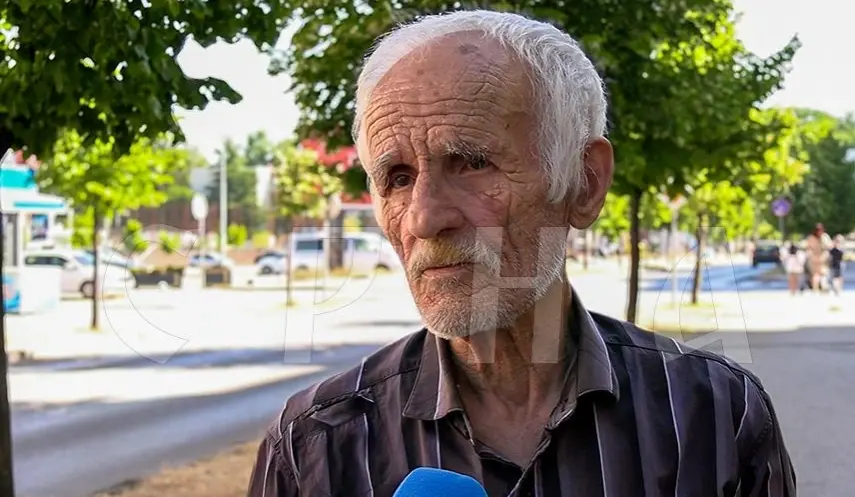ZUROVAC: SERBS MARKED BORDERS OF THEIR STATE WITH THEIR OWN HEADS
Republika Srpska - Nevesinje Uprising
07/03/2025
11:01

Emphasizing that, for him, the Herzegovina Uprising was a sign of the national awakening of the Serbian people at that time, Zurovac says he regrets that his novel "Nevesinjska Puška" has not yet seen the light of day, even though it was written almost 10 years ago.
Prepared by: Ognjen BEGOVIĆ
EAST SARAJEVO, JULY 3 /SRNA/ – The uprising of the Serbs known as Nevesinjska puška /1875–1878/ is undoubtedly a very important date in Serbian history, but, unfortunately, it is forgotten, just like the fact that Serbs never attacked other people’s territories, but marked the borders of their own state with their own heads, writer Dušan Zurovac told SRNA.
"If Karađorđe was the first nail hammered into the coffin of the mighty Turkish Empire, the Herzegovina Uprising was the second nail, and the Turkish Empire was already, in a way, dead... Unfortunately, we are doomed to mark the borders of our land, our Serbian land from time immemorial, with our own heads," Zurovac emphasized.
According to him, it took great courage at that time to raise such an uprising in proud Herzegovina.
"Mićo Ljubibratić, who was only 16 years old then, told his compatriots to choose the most honorable men among them as leaders of the uprising, men who would lead their people into the fight for Serb freedom," said Zurovac, who is also an essayist, prose writer, and playwright.
Not everyone can lead their people to die, Zurovac warns, recalling the verse of a famous Serbian song that says, "We are leaving never to return".
He points out that there is nothing like that anywhere else in history, and that the Herzegovina Uprising is a precedent in this sense.
"Nevesinje quickly liberated itself afterwards, many members of the Turkish army were captured in the two famous battles at Vučji Do and Muratovica, and many remained dead on the battlefield. The Serbs defended their land, while foreign mercenaries came to conquer someone else's. All captured Turks were exchanged; the Serbs did not take revenge on them... It is sad that even now we remain silent about this. To whom are we silent? This land is soaked with tears, sweat, and blood. And it is not nobody's land but ours, Serbian land!" Zurovac said categorically.
HERZEGOVINA UPRISING WAS LED BY THE MOST HONORABLE SERBS
Emphasizing that for him, the Herzegovina Uprising was a sign of the national awakening of the Serb people at that time, Zurovac says he regrets that his novel "Nevesinjska Puška" has not yet seen the light of day, even though it was written almost 10 years ago.
"At a time when half of Europe was half-dead from the blows of the Ottomans, led by Sultan Suleiman the Magnificent, the illiterate peasants of Herzegovina rose up against Turkish tyranny. Nevesinjska Puška set Europe ablaze back then, and yet we keep silent, year after year," Zurovac, who is also president of the "Istina" Association from East Sarajevo, which researches crimes against Serbs in Sarajevo from 1992 to 1996, stated for SRNA.
Zurovac points out that the Berlin Congress /1878/ was the greatest tragedy for the Serbs in Herzegovina, which was then left without Old Herzegovina, something he tries to prove in his book, not hesitating to remind of the indifferent and anti-Serbian policy towards Herzegovina and its people led by Montenegrin Prince Nikola at that time.
"Given my Herzegovinian origin, as an orthodox Nevesinje native, I experience my research on the Nevesinjska Puška uprising as my own moral dimension," Zurovac says.
In his novel, Zurovac adopts the views of most historians that the causes of the Nevesinjska puška uprising were deep, bearing in mind that at the time, the free countries of Europe already had parliamentary democracy, while Herzegovina was drowning in blood under Turkish tyranny.
"Of course, it is hard to even assume, let alone determine precisely, how many times the Serbs stopped Ottoman advances and how many times they rose up in arms to free themselves from Turkish slavery. Some of it is recorded in preserved documents, but certainly much of it has fallen into oblivion, as conquerors and occupiers systematically destroyed all records.
Even the former communist authorities turned a blind eye to the destruction of Serbian churches, which were either turned into mosques or had their tombstones and graves destroyed, starting from the Battle of Marica up to 1992, when everything with a Serbian name was being destroyed," Zurovac states. /to be continued/

SERBS IN TEARS AND FEAR OVER OWNERSHIP OF ORTHODOX CEMETERIES AND CHURCHES

CVIJANOVIĆ DEMANDS ACCOUNTABILITY FOR SHAMEFUL CONCERT IN ŠIROKI BRIJEG

OSTOJIĆ URGES BiH AND EU TO ACT OVER GLORIFICATION OF FASCIST IDEOLOGIES





